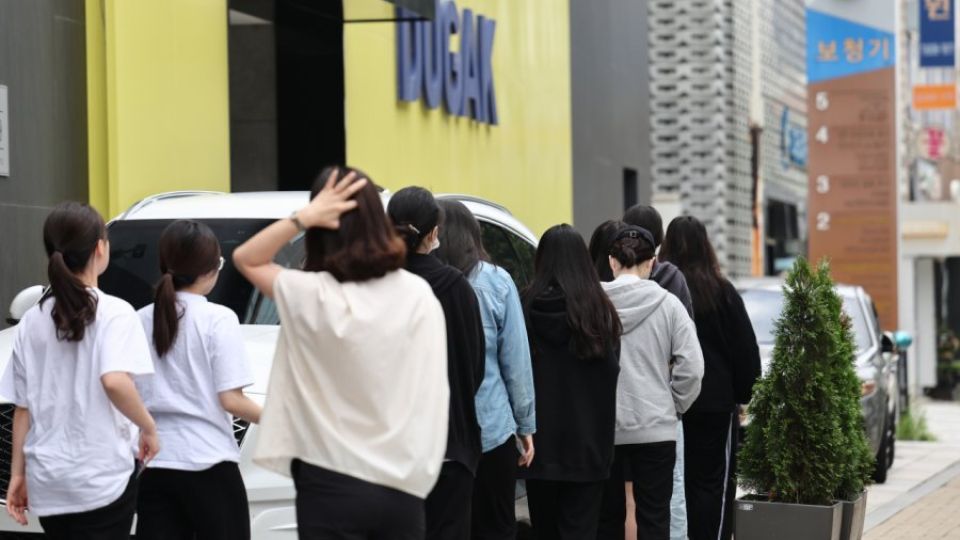June 27, 2023
SEOUL – The Education Ministry on Monday unveiled a set of comprehensive plans to alleviate private education costs for students, starting with setting up a ministry-led committee comprising public school teachers to adjust the difficulty level of the Suneung, the nation’s college entrance exam.
Calling it a way of restoring the fairness of the test, the committee will eliminate the so-called “killer questions” in the exams starting from this year, saying the difficulty level of such questions deviated from materials provided in school, forcing students to turn to private academies to achieve better grades.
“Receiving private education to make up for what one has learned during class is a personal choice, but reaching out to it for killer questions doesn’t seem right. The ministry is committed to taking action against the private education cartel profiteering from students and parents,” said Education Minister Lee Ju-ho as he unveiled the set of education reform measures released for the first time in nine years.
On the same day, the presidential office also indicated of the possibility of the government taking legal action against those profiting from the Suneung’s killer questions. The government has been receiving reports on teachers and professors who participated in making Suneung questions selling questions to private institutions, calling them “a private education cartel.” President Yoon Suk Yeol also instructed Education Minister Lee that the Suneung should only include educational material covered in public schools.
After a review of Suneung questions in the past three years and a mock test conducted in June, the ministry found 22 killer questions. A killer question from the Korean language and literature section, for example, asked students of modern philosophy concepts, while one of the English passages was quoted texts from an MIT paper about robot ethics.
By removing such questions, it would level the playing field for students, especially for those who cannot afford attending extra classes at private cram schools, the ministry said.
“Students felt discouraged knowing they won’t be able to do well on the test (compared to those receiving private education). But that’s not going to happen anymore,” said Oh Seung-geol, head of the ministry’s Responsible Public Education Policy Bureau, during the briefing.
While parents and students have expressed concerns that removing killer questions would make the Suneung easier, Minister Lee said the test would differentiate students by their achievement.
“Worrying that the Suneung will be easier is because (people) are persuaded by private education,” Lee said.
The ministry also hopes to build a learning environment where students can self-study with EBS — a state-run broadcaster specializing in education that offers online lectures — at their own pace and decide on what to learn based on their academic achievement. The premium paid courses will be made free, and the scope of the learning curriculum will be expanded for students at different levels.
Additional after-school supplemental teaching for students will also be available. The ministry plans to provide education support services by partnering with local governments and private institutes.
The move comes after South Korea saw a record-high 26 trillion won ($19.9 billion) in spending on private education last year, with the highest spending on English and mathematics to prepare for the Suneung. Students from elementary to high schools spent 410,000 won per month last year, marking a 50.9 percent increase from 2017, the ministry said citing its own data.
Along with the new committee overseeing the test’s difficulty, the ministry will review plans for public school teachers’ participation in determining the questions, as well as disclosing additional information on Suneung questions starting next year.
In addition, as part of the ministry’s move to rein in private tutoring for college admissions, free college counseling services will be provided for high school students, in which teachers will provide them with related information and what to prepare for. The minister, in particular, stressed the importance of equal opportunities in college admissions regardless of their parent’s wealth and social status.
The ministry will also closely look into university admission exams — especially the writing and speaking sections — to make sure that such questions only reflect materials taught in class. When universities fail to comply with such standards, the ministry will issue a corrective order. If the same problem arises again, the ministry will order the school to reduce its enrollment quota.
Extracurricular activities — lessons for which are usually more expensive than cram classes at private academies — will be made accessible for elementary school students. The ministry said it would absorb the demand for private education within public education by running more sports and fine arts programs, expanding facilities like swimming pools and teaming up with private organizations such as the Korea Taekwondo Association to allow students to experience and participate in various outdoor activities.
To address concerns that private tutoring starts as early as kindergarten to prepare for first grade, the ministry will revise the curriculum for children aged between 3 and 5 with the National Education Commission to ensure that students can make a smooth transition from kindergarten to elementary. It will also connect the semester between preschool and elementary school to help students better adjust.
The ministry will also scrutinize improper operations in private English academies for young children by teaming up with education offices.
Financial aid for after-school tutoring in English, arts and sports will also be available to quell the burden on parents in out-of-school academic spending.
“The new set of measures is to give students and parents wider educational choices in academics, sports and arts. Students and parents will be returning to public education in line with the change,” Lee said.


